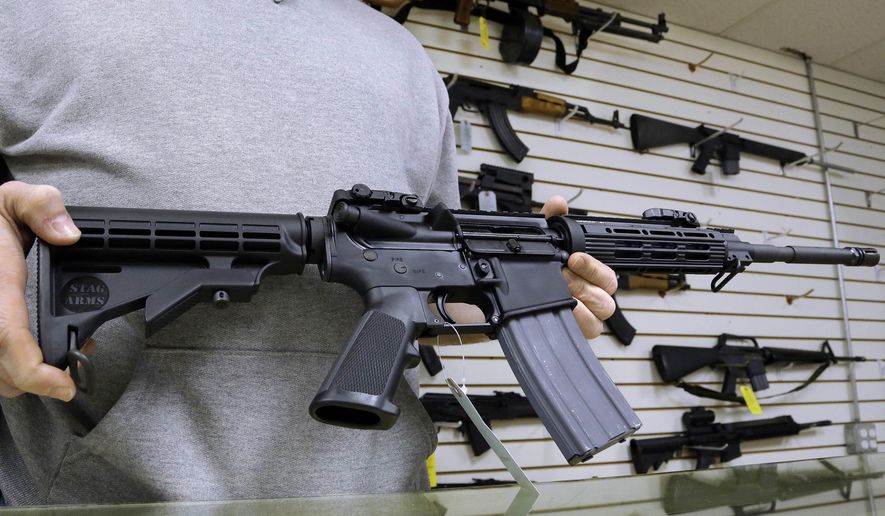Fifty House Republicans have petitioned President Biden to stop the Pentagon’s plan to ban commercial production of AR-15 ammunition at the Lake City Army Ammunition Plant in Missouri, which makes as much as 40% of the commercially available AR-15 bullets in the U.S.
The factory, owned by the Department of Defense, has allowed private contractors over the years to operate the plant and produce 5.56 mm ammunition, which is used in AR-15 semi-automatic firearms, for commercial sales that exceed U.S. military needs.
Sen. Roy Blunt, Missouri Republican, later told The Washington Times that the White House would not follow through on the plan.
“The contract’s been in place like it is for most of post World War II America. … I’ve been assured there will not in the near future, or in this administration, would there be a change in that contract,” he said.
The lawmakers’ letter, spearheaded by Reps. Vicky Hartzler and Sam Graves of Missouri, said the Biden administration had tried to circumvent Congress by banning ammunition for the popular firearm.
“Severely limiting the commercially available 5.56 ammunition, which is most popularly used in modern sporting rifles (MSRs), is effectively a politically sanctioned semi-automatic rifle ban. This blatantly infringes on the Second Amendment of the United States Constitution by limiting law-abiding gun owners’ ability to legally purchase or use lawful semi-automatic rifles,” the members wrote in the letter Monday to Mr. Biden.
The lawmakers wrote that the plant “currently produces a significant portion of this type of 5.56 mm ammunition for the commercial market” and allows the operating contractor to maintain capacity and keep the facility at a high state of readiness at no cost to the government.
Additionally, the factory ensures that “the Army is ready to ramp up production in the event of a national emergency.”
They said the ammunition production ban “will compromise Army readiness by further delaying the deployment of the Army’s Next Generation Squad Weapon.”
“This decision will result in the immediate termination of up to 500 highly skilled employees and undermine the facility’s ability to hire and retain the skilled workforce needed to carry out the contract with the Department of Defense,” they wrote.
“Additionally, the decision will exacerbate an already serious shortage of ammunition in the commercial market currently facing law-abiding gun owners.”
Winchester Ammunition, a division of Olin Corp., is the private contractor that produces the ammunition at the Lake City Army Ammunition Plant.
Winchester notified the National Shooting Sports Foundation on June 15 that the Defense Department was considering prohibiting the production of 5.56 mm ammunition at the plant.
The White House on Tuesday denied that the administration plans to prohibit sales at the Lake City Army Ammunition Plant.
“The administration is not going to restrict production/sales of excess ammunition currently available for sale to the public,” White House spokesman Andrew Bates said on Twitter.
Larry Keane, general counsel of the National Shooting Sports Foundation, said he does not believe the administration is backing off just yet. He noted that the Obama administration attempted to ban the ammunition produced at the Lake City Plant in 2015.
“My understanding was there was an internal discussion at DOD … about this issue towards the end of last week. But, as of now, we have not heard anything definitive that they are not going to do this now,” Mr. Keane said.
“The Obama ATF [Bureau of Alcohol, Tobacco, Firearms and Explosives] tried to declare the ammunition coming out of Lake City to be armor-piercing. It is not by definition, armor-piercing ammunition, which is a defined term in the Gun Control Act,” Mr. Keane said.
“They received over 300,000 comments from folks as well as in the industry. They very quickly backed off under congressional pressure as well as just general consumer political pressure. Here we are seven years later. They can’t declare it illegal, so now they want to make it unavailable,” he said.
Mr. Keane said the Senate gun control legislation could fail if the Biden administration goes forward with an ammunition production ban at Lake City.
“I think it’s recognized that doing this would be very detrimental to any ongoing Senate discussions about reaching some sort of framework agreement or moving forward with that framework,” he said.
Correction: A previous version of this article misstated the name of the private contractor at the Lake City Ammunition Plant.
• Kerry Picket can be reached at kpicket@washingtontimes.com.




Please read our comment policy before commenting.